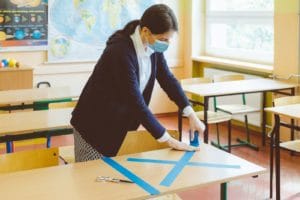As a professional educator, you know that being a teacher is a demanding job. The rewards are many, but so are the stressors. Whether you are facilitating classroom management, navigating the parent-teacher relationship, dealing with paperwork, or making time for lesson planning, it’s easy to feel overwhelmed and stressed while trying to keep track of it all. If left unchecked, the stress of teaching can take a toll on you and can even lead to burnout.
If fact, about 17% of educators don’t return to teach after their fifth year, according to the U.S. Department of Education. While there are many reasons for teachers choosing not to continue to teach, stress plays a role. One study estimates that 93% of educators are teaching in high-stress environments, while 87% of teachers worry the demands of the job interferes with their family life and 78% report being physically and emotionally exhausted at the end of the day.
How do you keep the effects of stress at bay so that you can continue to experience the rewards of teaching? One of the best ways to manage stress is to practice self-care.
The Four Categories of Self-Care … and Putting on Your Own ‘Oxygen Mask’ First
While self-care sometimes is derided as a selfish practice, it’s actually quite the opposite. Self-care is any practice or activity that promotes your overall sense of wellbeing. Far from self-indulgent practice, self-care often requires discipline and a commitment to healthier lifestyle habits. Self-care generally falls into four categories:
- Physical
- Mental/emotional
- Relational
- Spiritual
Taking care of your wellbeing in each of these four areas can help to minimize the effects that daily stress has on your physical and mental health.
Many people struggle with prioritizing self-care, saying that they feel guilty taking time for themselves instead of spending time making headway on their ever-growing to-do list. It’s helpful to think about self-care using the oxygen-mask analogy: When the flight attendants are going over pre-flight safety procedures, they instruct passengers to put their oxygen masks on first before helping others.
This might seem counterintuitive. Wouldn’t you want to make sure your child is safe before taking care of your own safety? Of course! But when the cabin pressure is decreasing on the plane, you risk losing consciousness before being able to help your child. With your own mask on and working properly, you’ll be able to take care of your child. Self-care is a lot like putting your own oxygen mask on first. It enables you to manage stress so that you can be present in your role as educator.
Easy Ways to Practice Self-care Every Day
So how do you begin to put your own oxygen mask on first and practice self-care as a busy educator? Start with the basics. Try these simple and effective self-care practices every day:
- Put away distractions before bed (TV, phone, etc.).
- Get the recommended seven to eight hours of sleep so that you feel refreshed the next morning.
- Eat breakfast before work and bring a healthy lunch to help you stay energized for the day.
- Go for a walk around the block when you come home from work to help decompress from your stressful day.
- Stay connected to friends and family throughout the week to take advantage of your social support.
Simple practices like these can go a long way to minimize the effects of stress on your day-to-day life.
It’s helpful to have a few relaxation techniques in your self-care toolkit to help you manage stress throughout the school day. For example, deep breathing is a research-backed method to battle stress, and it’s easy to use throughout the school day. Use it before you start the school day, between classes, and during breaks to help reduce blood pressure, muscle tension, and heart rate.
Apps like Calm, Pacifica and Headspace are great options if you want an easy guide relaxation technique. And don’t underestimate the power of a quick walk around the school to de-stress.
When you incorporate simple self-care practices like these into your daily life, you can spend more time doing what you love as an educator and less time feeling stressed and overwhelmed. Don’t be afraid to make time for self-care. The benefits are invaluable!










